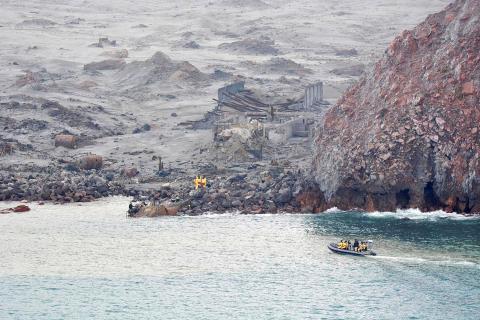Elite soldiers yesterday retrieved six bodies from New Zealand’s volatile White Island volcano, winning praise for a “courageous” mission carried out under the threat of another eruption.
At first light, two military helicopters set off from the Whakatane Airport for the offshore volcano, where an eruption on Monday killed at least 16 people and severely injured dozens more.
The goal of the team from the bomb disposal squad was to recover the remains of eight people still on New Zealand’s most active volcano, which sits 50km out to sea.

Photo: AFP
After a four-hour wait, while vulcanologists monitored live seismic feeds for signs of another explosion, police said that most of the bodies had been safely airlifted to a naval frigate anchored off the coast.
“Those staff showed absolute courage in order to ensure those six people were returned to their loved ones,” New Zealand Police Commissioner Mike Bush told reporters, saying that they were operating in an “unpredictable and challenging” environment.
Efforts to locate the two remaining bodies were ongoing, with divers searching nearby waters after a corpse was seen floating in choppy seas on Tuesday, Bush said.
Helicopters were also searching over the Bay of Plenty and Bush did not rule out a return to the island when conditions were safer.
Drone flights helped locate the six bodies on the caldera before the operation began, and the six-strong team labored to reach them in heavy hazmat suits and breathing gear that restricted movement.
New Zealand Special Operations Component Commander Rian McKinstry said he was “incredibly proud” of the team, who dealt with heat stress as they prepared the bodies to be airlifted out.
“It was a unique operation, but unique operations are what organizations like the Explosive Ordnance Disposal Squadron gets involved in,” he said.
On the eve of the operation, GeoNet vulcanologist Nico Fournier said that the dangers facing recovery teams if an eruption occurred included magma, superheated steam, ash and cannonball-like rocks thrown from the caldera at supersonic speed.
As the military began their grim task, police took grieving families out near the volcano on a boat to perform a Maori blessing and locals chanted karakia, or prayers, on the shore as the island smoldered in the distance.
Despite the risk of an eruption inside 24 hours being put at 50 to 60 percent, New Zealand Prime Minister Jacinda Ardern said that those involved wanted to help grieving families.
“Today was all about reuniting them with their loved ones,” she said, adding that she was on tenterhooks when the military team was on the volcano.

A new online voting system aimed at boosting turnout among the Philippines’ millions of overseas workers ahead of Monday’s mid-term elections has been marked by confusion and fears of disenfranchisement. Thousands of overseas Filipino workers have already cast their ballots in the race dominated by a bitter feud between President Ferdinand Marcos Jr and his impeached vice president, Sara Duterte. While official turnout figures are not yet publicly available, data from the Philippine Commission on Elections (COMELEC) showed that at least 134,000 of the 1.22 million registered overseas voters have signed up for the new online system, which opened on April 13. However,

ALLIES: Calling Putin his ‘old friend,’ Xi said Beijing stood alongside Russia ‘in the face of the international counter-current of unilateralism and hegemonic bullying’ Chinese President Xi Jinping (習近平) yesterday was in Moscow for a state visit ahead of the Kremlin’s grand Victory Day celebrations, as Ukraine accused Russia’s army of launching air strikes just hours into a supposed truce. More than 20 foreign leaders were in Russia to attend a vast military parade today marking 80 years since the defeat of Nazi Germany in World War II, taking place three years into Russia’s offensive in Ukraine. Putin ordered troops into Ukraine in February 2022 and has marshaled the memory of Soviet victory against Nazi Germany to justify his campaign and rally society behind the offensive,

ENTERTAINMENT: Rio officials have a history of organizing massive concerts on Copacabana Beach, with Madonna’s show drawing about 1.6 million fans last year Lady Gaga on Saturday night gave a free concert in front of 2 million fans who poured onto Copacabana Beach in Rio de Janeiro for the biggest show of her career. “Tonight, we’re making history... Thank you for making history with me,” Lady Gaga told a screaming crowd. The Mother Monster, as she is known, started the show at about 10:10pm local time with her 2011 song Bloody Mary. Cries of joy rose from the tightly packed fans who sang and danced shoulder-to-shoulder on the vast stretch of sand. Concert organizers said 2.1 million people attended the show. Lady Gaga

CONFLICTING REPORTS: Beijing said it was ‘not familiar with the matter’ when asked if Chinese jets were used in the conflict, after Pakistan’s foreign minister said they were The Pakistan Army yesterday said it shot down 25 Indian drones, a day after the worst violence between the nuclear-armed rivals in two decades. Pakistani Prime Minister Shehbaz Sharif vowed to retaliate after India launched deadly missile strikes on Wednesday morning, escalating days of gunfire along their border. At least 45 deaths were reported from both sides following Wednesday’s violence, including children. Pakistan’s military said in a statement yesterday that it had “so far shot down 25 Israeli-made Harop drones” at multiple location across the country. “Last night, India showed another act of aggression by sending drones to multiple locations,” Pakistan military spokesman Ahmed